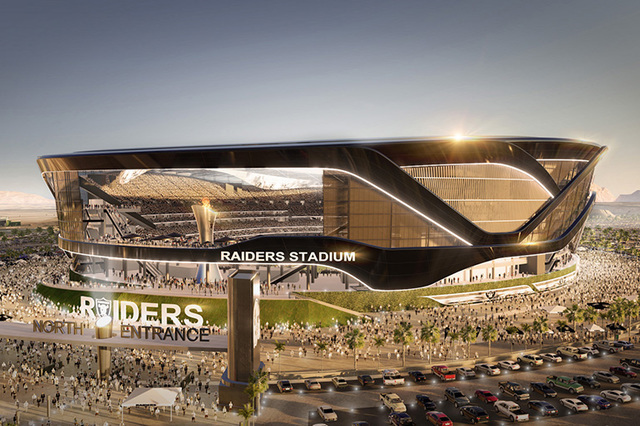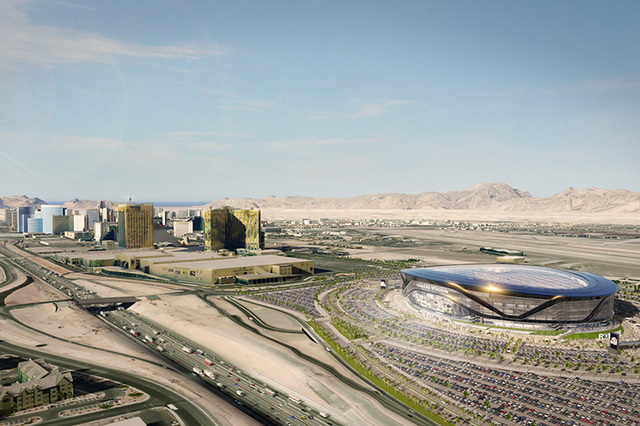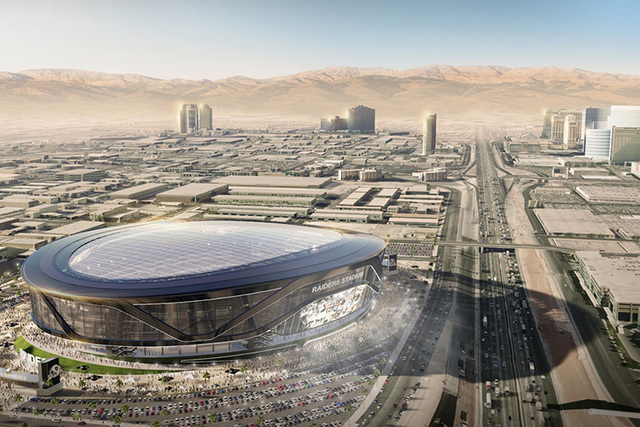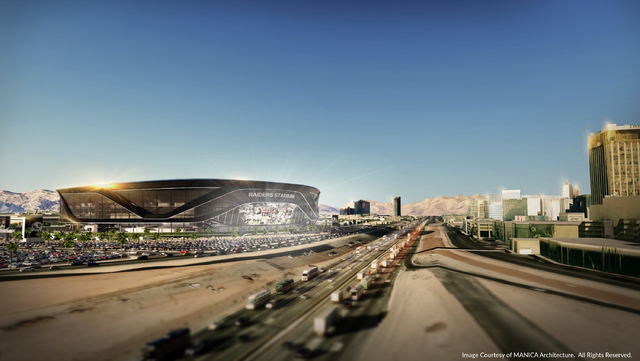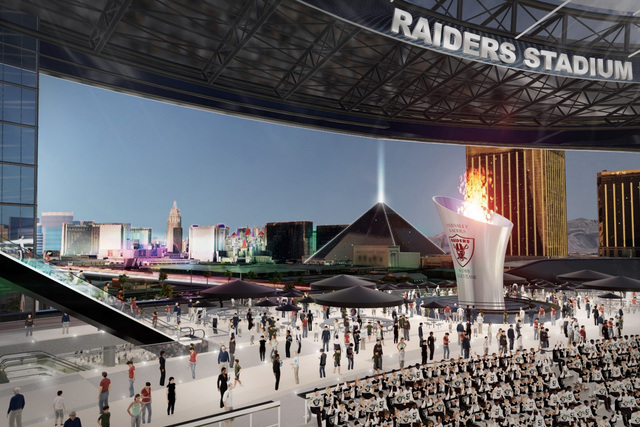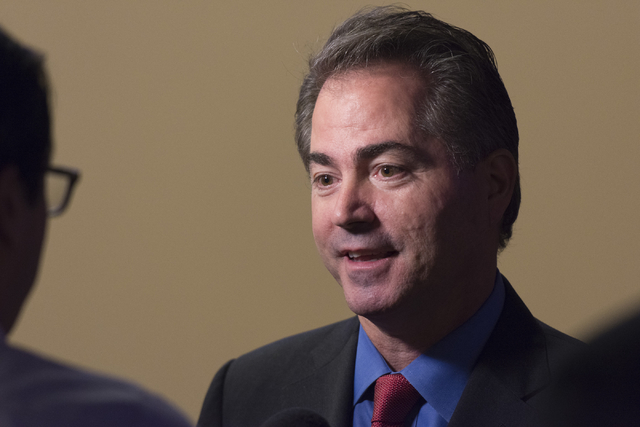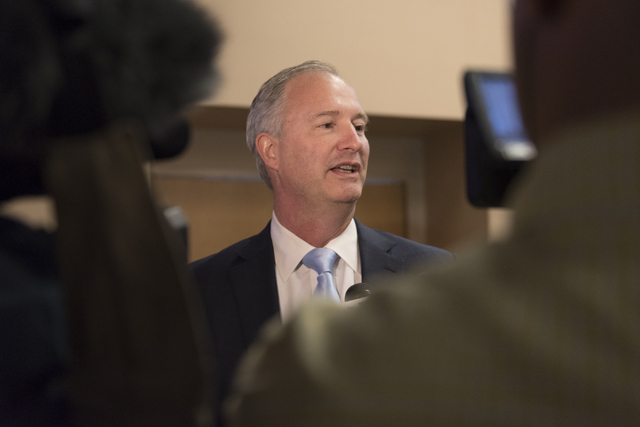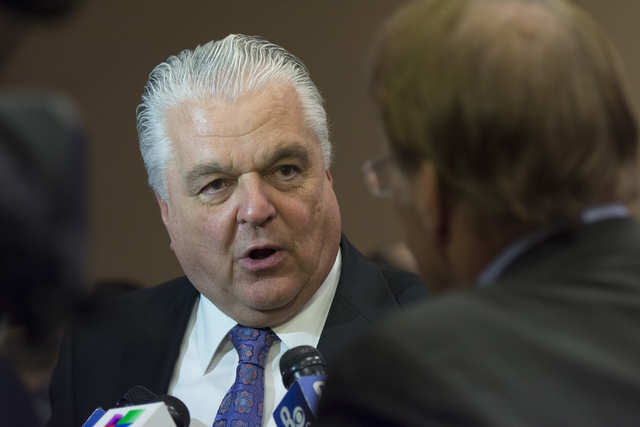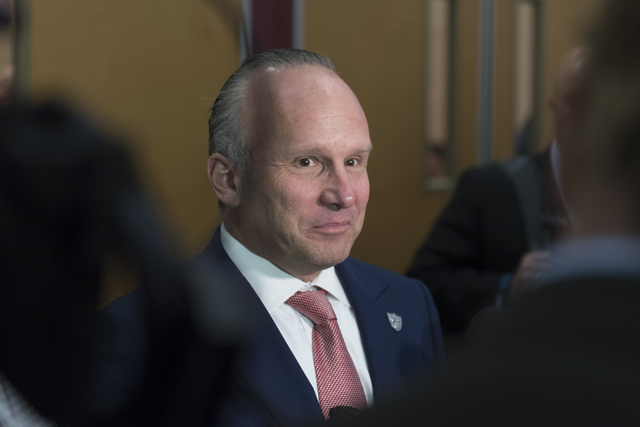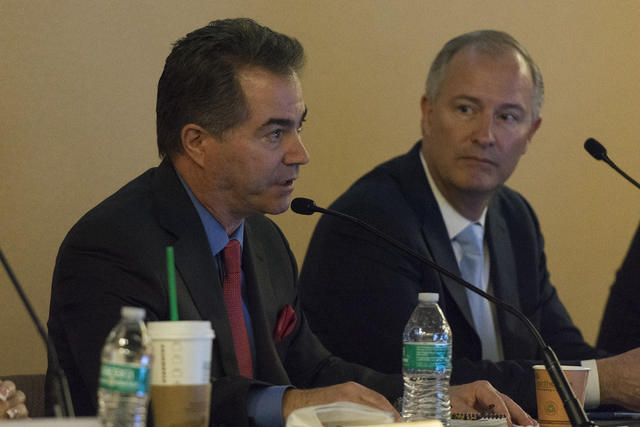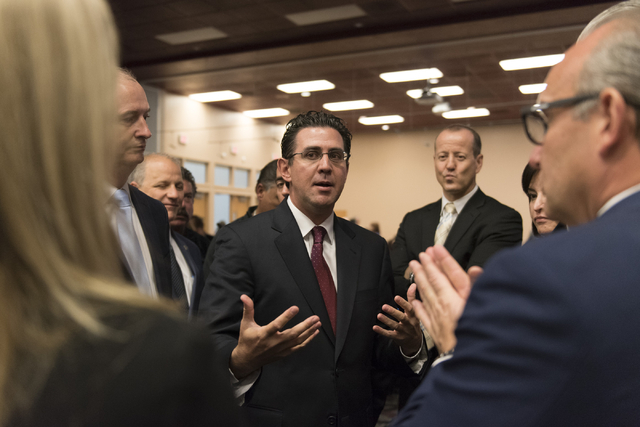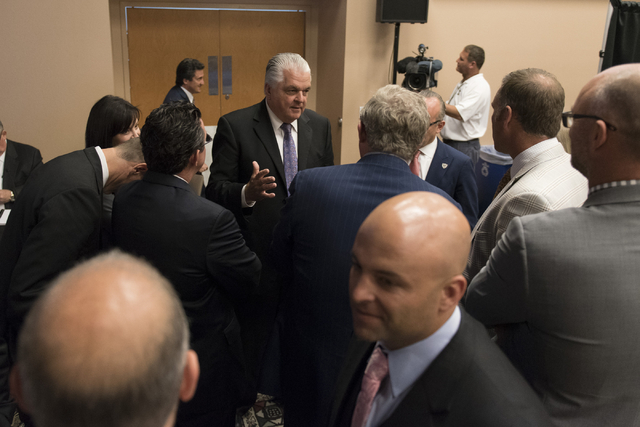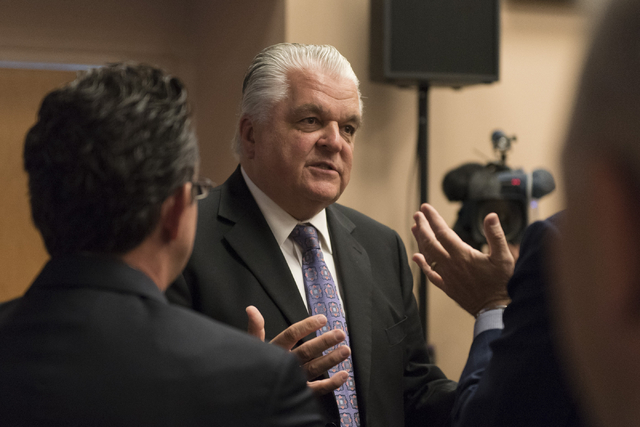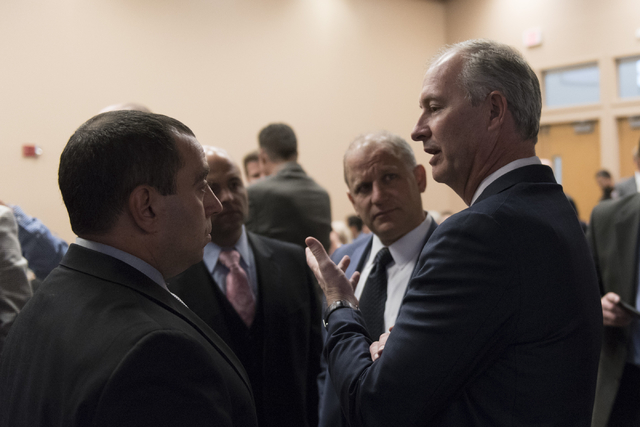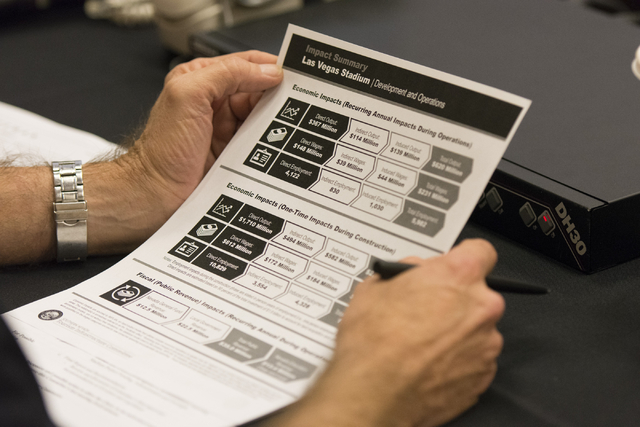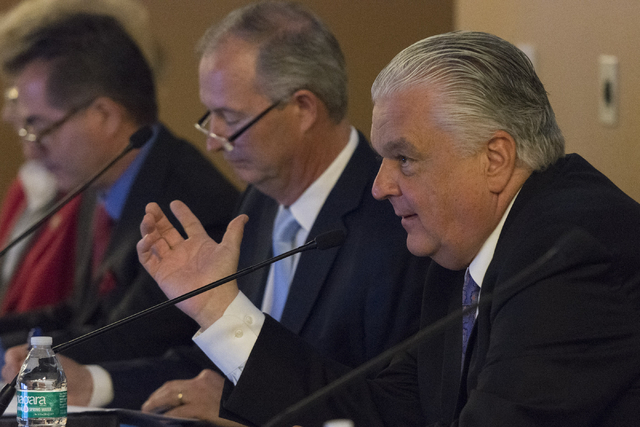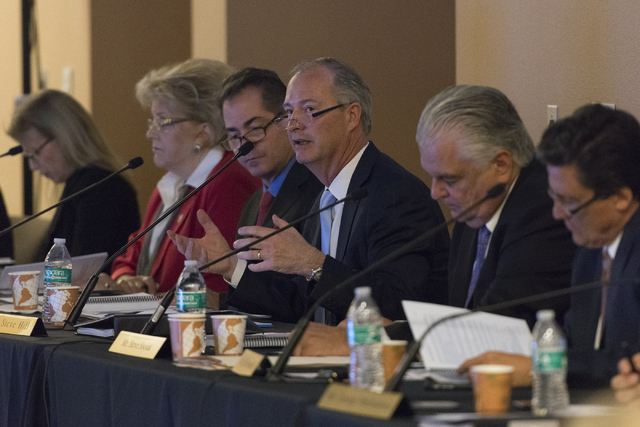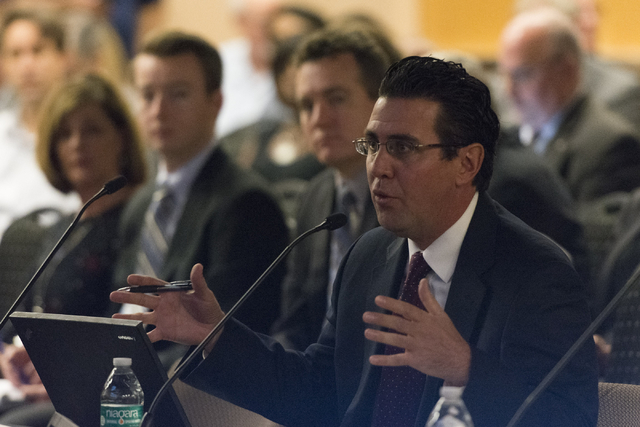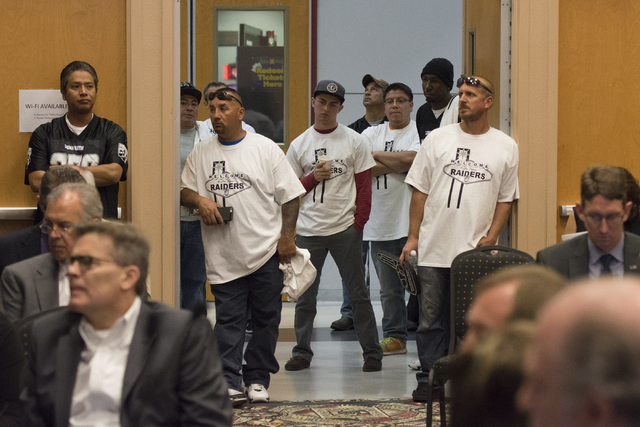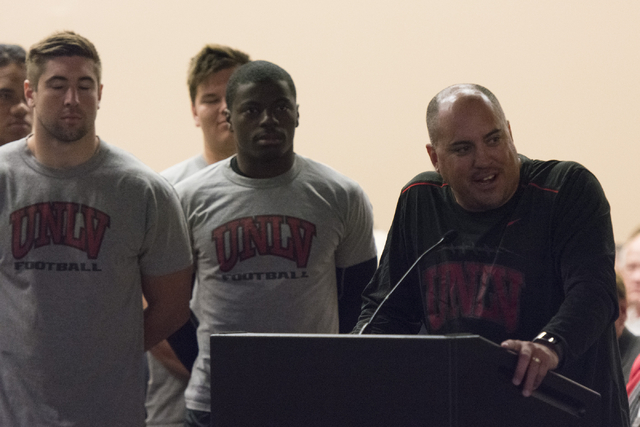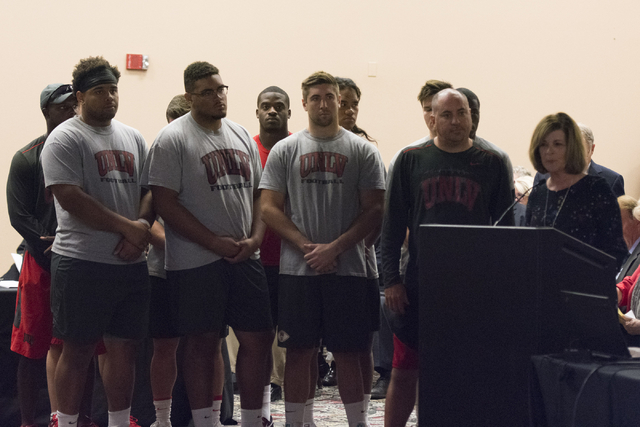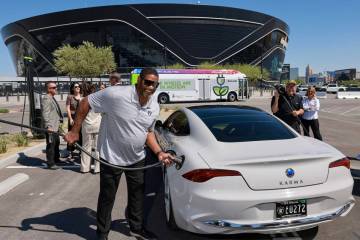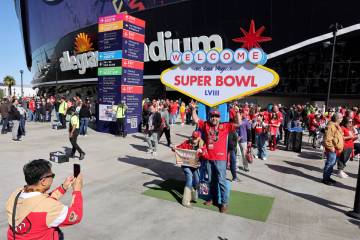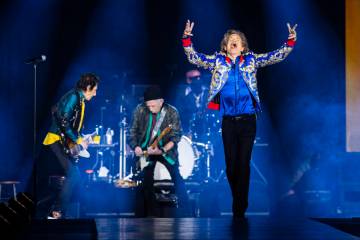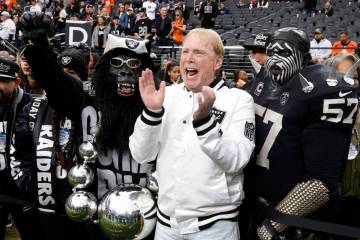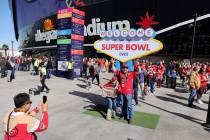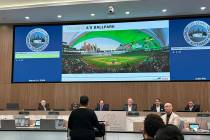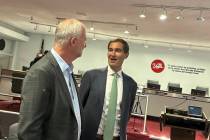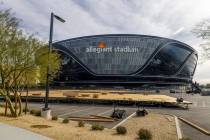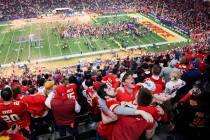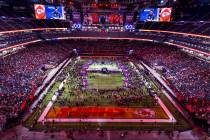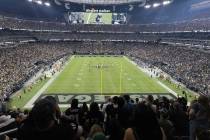Las Vegas committee sends Raiders stadium plan to governor
Plans for a $1.9 billion domed stadium won the recommendation of the Southern Nevada Tourism Infrastructure Committee on Thursday, sending a proposal that could bring the NFL to Las Vegas to Gov. Brian Sandoval for his consideration.
At a meeting stoked with enthusiasm and a few minor squabbles, the 11-member committee unanimously supported the stadium developers’ preferred funding option, which requires a $750 million public investment, eliminates a 39 percent public contribution cap and allows the private partners to reap all stadium profits during the lifetime of the Raiders’ lease.
The deal requires the family of Las Vegas Sands Corp. Chairman Sheldon Adelson, Majestic Realty and the NFL’s Oakland Raiders to pay the remainder of the construction costs for the 65,000-seat stadium, along with any cost overruns.
Adelson has pledged to contribute at least $650 million, while the Raiders would pay $500 million.
“We could not have asked, in my opinion, for a better team in bringing this project forward, explaining it and making sure that the public was well represented,” said Clark County Commission Chairman Steve Sisolak, a member of the special committee. “We vetted every single word in this proposal. I think everybody is a winner today.”
Sandoval now must decide whether to call a special session of the state Legislature to approve the financing plan, which hinges on a Clark County hotel room tax increase. If lawmakers approve the plan, the Oakland Raiders have promised to pursue relocation to Las Vegas.
The location of the proposed stadium remains undecided. A 62-acre area northwest of Russell Road and Interstate 15 is the developers’ preferred site, but the 140-acre Bali Hai Golf Club, between I-15 and Las Vegas Boulevard, just south of Russell, is an option. The committee did not recommend either site, leaving that decision to the developers and a stadium authority board.
In a statement released shortly after the meeting, Sandoval said he would start reviewing the committee’s recommendations but would not “move forward until all questions have been resolved.”
“Nevada has served as the standard bearer for global tourism, gaming, and conventions for decades,” Sandoval said. “In order to remain the top destination, we must explore potential opportunities and push forward to lead this international industry into the next generation of travel and tourism. I am hopeful the work completed by this committee will serve as a roadmap to Southern Nevada’s unrivaled and continued success.”
Andy Abboud, vice president of government relations and community development for Las Vegas Sands, said that if the state Legislature doesn’t hold a special session before the Nov. 8 election, then it could make it more difficult for a Raiders relocation package to be approved by the NFL in January. Abboud then acknowledged that the final call must come from Sandoval.
“Let’s enjoy this for about five minutes and we’ll find out what the governor is going to say,” said Abboud, who is representing Adelson in the stadium negotiations. “We feel confident that he understands what needs to be done.”
The committee also agreed to create a stadium authority board made up of seven members. Three would be appointed by the governor and two would be named by the County Commission. The remaining two members would be appointed by the five other members.
“I think it reinforces and bolsters the world-class brand that we have built so far in Southern Nevada,” said Kristin McMillan, president and CEO of the Las Vegas Metro Chamber of Commerce, who sat on the committee.
“We’re known as the entertainment capital of the world, and we’re known for having world-class assets,” McMillan said. “It’s taken us to the next level to the extent that we’re getting two major-league franchises here through the NHL, and now, the NFL.”
Before the meeting started, about 20 people spoke in support of the stadium. Clark County Commissioner Chris Giunchigliani was the only person to oppose the project’s funding plan, which calls for a 0.88 percentage-point increase in Clark County’s room tax to finance general obligation bonds over 33 years.
“I support a stadium, but not with public financing,” Giunchigliani said. “There’s so much in the details that have not been vetted. No public-financed stadium in the United States has benefited the public.”
UNLV athletic director Tina Kunzer-Murphy opened the public comment period with a passionate plea for a stadium to be built. Rebels football coach Tony Sanchez followed, saying the cachet of playing in a state-of-the-art facility shared with an NFL team would take UNLV’s program “to an entirely different level.”
“It’s very important to me that the stadium get built,” Sanchez told the panel, surrounded by members of his team. “In the landscape of college football, it’s a game changer.”
Las Vegas Mayor Carolyn Goodman also stepped forward and gave one last pitch for building the stadium at Cashman Center in downtown, noting that many of the freeway and road improvements are already funded and underway to provide adequate access.
“This is about timeliness,” Goodman, who sits on the committee, told her colleagues. “We have an opportunity here in Las Vegas to move something so wonderful, and to couple it with UNLV.”
As Goodman was about to take her seat, Sisolak came over and the two hugged, setting a conciliatory tone that carried until the committee had stamped its recommendation for delivery to Carson City.
The Review-Journal is owned by the family of Sheldon Adelson, chairman and CEO of Las Vegas Sands Corp.
Contact Art Marroquin at amarroquin@reviewjournal.com or 702-383-0336. Follow @AMarroquin_LV on Twitter.
RELATED
MGM's buy-in was key to stadium project gaining recommendation
Oakland Raiders owner Mark Davis: 'Everybody wins' in Las Vegas stadium vote
Giunchigliani places stadium plan on Tuesday County Commission agenda
Southwest critical of Bali Hai site for proposed stadium
Gov. Sandoval calls for clarity on proposed stadium's road infrastructure costs



